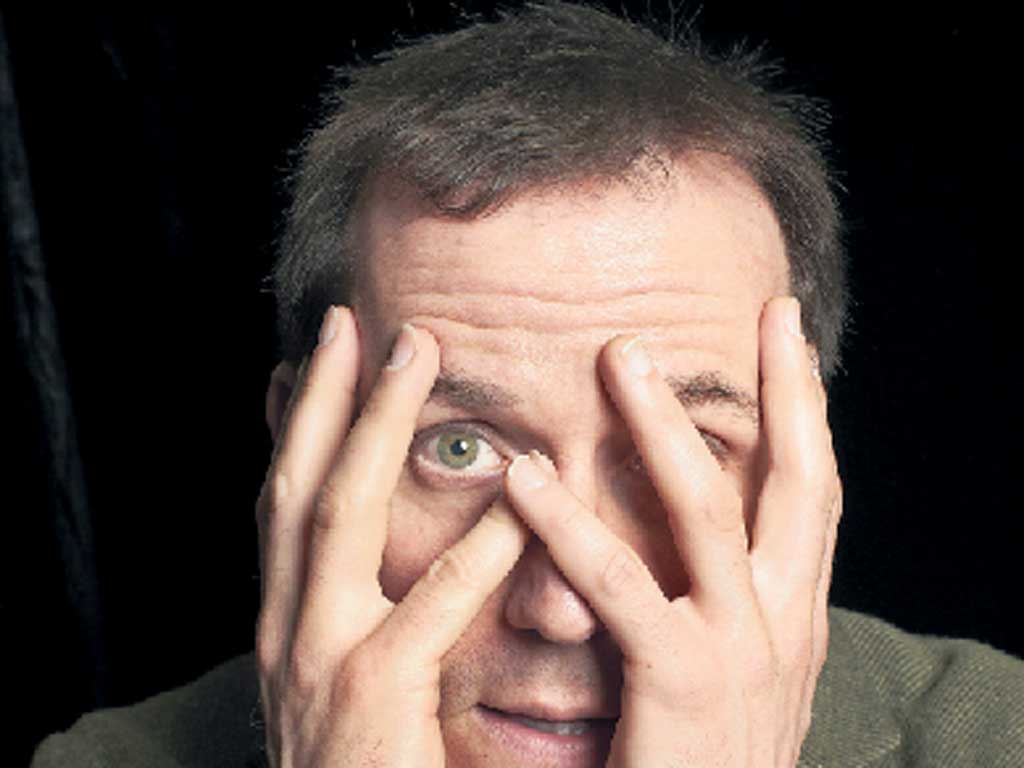Ben Miller: Survival of the wittiest
Heard the one about evolution? Stand-up is a science, says the comedian Ben Miller, and dying on stage is all down to Darwinism

I remember the moment vividly. I was second on the bill at a stand-up night with Harry Hill headlining at the Brighton Ballroom in the early 1990s, and I was dying. My one-liners were falling flat, as were my attempts at surreal impressions. Then, an attractive, dark-haired women at the front of an audience of 200 people said in a quiet voice: "Anyone could do that."
If I had been an elite sportsman, you would say I choked, but I wasn't an elite anything. I was a nobody. A giant existential wormhole now opened up beneath me, leading down through a whirling black hole of comedy hell and out to the beginnings of the universe. Some strange part of my brain – the detached, all-seeing part that always believes you are going to win a game of table tennis – floated up into the sky and looked down. I saw myself standing on this pathetic little stage with my pathetic act, not even managing to provoke interest, never mind make anyone laugh. Every organ of my being was suddenly sluiced in shame.
That night, on the long drive home, I reflected on the similarities between evolution and comedy. My death that night and everything I've witnessed since leads me to one inescapable conclusion. Anyone who wants to understand the pressures that drive a species to change over time could do a lot worse than study the comedian in their natural habitat. It would have made a belting dissertation subject when I studied science at Cambridge. Alas it is only now TV channel Eden has asked me to write an essay to mark its science month that I can explore this unlikely hypothesis further.
Darwin tells us that for evolution to work, more offspring must be produced than can survive. Those who have been to an open mic night will be aware that the number of people who want to be stand-up comedians is significantly greater than the number that has any chance of making it. It's pure survival of the fittest. The night I died on stage in Brighton, Harry Hill came on and not only survived but brought the roof down.
Variability of traits between individuals is also important for evolution by natural selection. There's no doubt that we see plenty of that in comedy. I have seen everything from a young woman climbing into a suitcase and zipping it up behind her to a grown man lighting a firework and firing it from his behind. They don't call it "variety" for nothing.
Evolution requires reproduction. The successful stand-up gets to reproduce their act at other comedy clubs or possibly even on television. I understand the latest advances in quantum computing are going to enable brain implants so that our every waking moment is accompanied by a Michael McIntyre observational comedy routine.
Scientists have proposed a variety of evolutionary theories of humour that mostly boil down to comedians trying to get laid. American evolutionary biologist Richard D Alexander, for example, suggested in his 1986 book Ostracism and Indirect Reciprocity: the Reproductive Significance of Humour, that the point of telling jokes was to raise one's own status, lower that of certain other individuals, and enhance social unity. And to get laid.
Comedy also goes through its own evolutions. It all started with cavemen being unable to contain themselves when one of their number was sat on by a woolly mammoth. A century or so ago everyone would collapse into hysterics at the sight of men in face-paint driving around a big top in a collapsible car with square wheels. There was the exaggerated, physical comedy of Charlie Chaplin and Laurel and Hardy, moving through Morecambe and Wise, Monty Python and the slapstick of The Young Ones and Fawlty Towers.
Homo sapiens have engaged in humour for thousands of years. There were jesters and joke books in Ancient Greece. Funny conversations were observed by the first anthropologists to observe Australian aboriginals, then genetically isolated for some 35,000 years. Though as anyone who has ever sat through a Shakespearean comedy will attest, not all jokes keep their allure down the centuries.
I see the comedy of the future becoming ever more minimalist until one day we are so sophisticated that being funny will no longer be of use in obtaining food, shelter or making us attractive to the opposite sex. It is a trait that is gradually losing its evolutionary rationale. According to my calculations, the death of comedy will therefore occur in approximately the year 6000.
As admittedly somewhat thin evidence for my hypothesis, I would point to Earth's more advanced cultures. The Swiss, for example, don't have an embarrassment of top comedians. I'd tentatively suggest there are few people on the planet that would part with hard cash for a night at a comedy venue in Basel.
Whereas once we thought of our life-sustaining Earth as a one-off, astronomers using the Kepler space telescope are discovering that there are vast numbers of planets orbiting other stars. There's a growing view that life is commonplace elsewhere in the universe. If intelligence and culture are by-products of increasing complexity in organisms, this raises the interesting question of what other forms of comedy have evolved out there. It's also great news for Lee Evans's promoter, as it means there are a lot more venues for him to tap.
This essay is an extract from 'The Eden Articles', a free e-book that is available from Amazon and iTunes from 20 July and from the Eden website uktv.co.uk/eden/tv
Ben Miller presents 'What Is One Degree?' on Friday 20 July at 8pm on Eden (Sky Channel 532, Virgin Channel 208)
Join our commenting forum
Join thought-provoking conversations, follow other Independent readers and see their replies
Comments
Bookmark popover
Removed from bookmarks